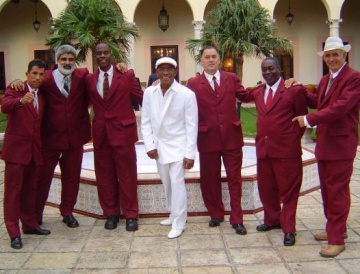About artist
Cuban sonero and composer Ignacio Piñeiro founded Sexteto Nacional in 1927, as Columbia Records’ answer to RCA Victor’s popular Sexteto Habanero. Both groups added the trumpet, and so defined the classic septet sound. Today, third-generation descendants of Septeto Nacional continue to define Cuba’s consummate son tradition. Augmenting the septet’s sound and embellishing its classic repertoire are vocalists Pío Leyva, Caridad Cuervo and Bertha Portuondo, congüero Tata Güines, pianist Guillermo González Camejo "Rubalcaba" and tres master Pancho Amat. Their close renditions of two well-known Piñeiro compositions (No Juegues Con Los Santos, featuring Cuervo, and Coco Mai Mai, featuring Portuondo) sustain an intuitive interplay between the band’s three singers, the musicians and their guest counterparts. Lead singer Eugenio Rodríguez "Raspa" can turn a song inside out (e.g., Llora Como Llore, Quimera, Tu Mi Afinidad), while Leyva’s wicked, raspy 82-year-old baritone (as heard on the recent Afro Cuban All Stars) intertwines with Rubalcaba’s stylish piano in a compelling fashion.
History
At the end of the 19th Century in the sugar cane and coffee plantations of the Cuban 'Oriente' region, two different music styles began to combine: the rhythms of Africa and the songs of Spanish heritage.
The result was a new music: the Son Oriental whose popularity, in the beginning, was limited to the rural areas of its origin. Officially it was classified as frivolous and indecent. However, its fame spread quickly to the urban neighbourhoods of the main cities in the region.
At that time Son was played by small combos composed of three to five musicians. Among the first groups to achieve fame were the Cuarteto Oriental and some years later the famous Trio Matamoros.
At the beginning of the twenties Havana experienced a major influx of orientales (people from 'Oriente') and due to their cultural influence Son became more and more accepted in the Capital. The 'Habaneros' (people from Havana) fell in love with the new rhythm and immediately put their peculiar stamp on it, speeding up the tempo, and playing it with six musicians.
During that period new groups such as the Sexteto Bolona and the Sexteto Occidental were formed and others, like the Cuarteto Orientall becomeing the Sexteto Habanero, adapted to the new conditions.
A young musician named Ignacio Piñeiro still was not satisfied by the existing sound of the Son groups. This sound was mainly based on vocals percussion and strings. Thus in 1927 he created his own group: the 'Septeto Nacional' adding, for the first time in the history of Son, a trumpet as lead instrument.
This completely changed the sound and Son quickly became the most celebrated music in Cuba. Not long after, it also became well known outside the country. When in 1928 Son and Septeto Nacional were the sensation of the World Exposition in Sevilla. Son was here to stay and became the basis for many other music styles. like Mambo and Salsa. Today, after more than seventy years of success, the "Septeto Nacional" is still alive and kicking.
Young gifted talents continue the tradition founded by Ignacio Piñeiro











